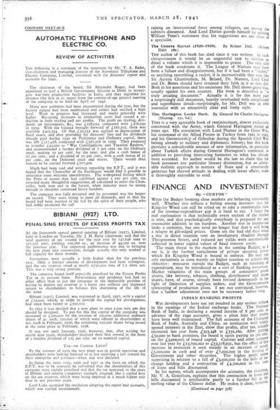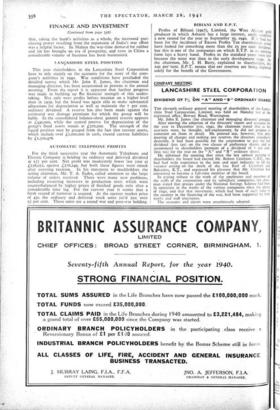FINANCE AND INVESTMENT
By " CUSTOS "
Wrrx the Budget looming close markets are behaving remarkably well. Whether this reflects a feeling among investors that Sir Kingsley Wood can still be relied on to take a comfortable view of the revenue-expenditure gap it is hard to say. I fancy the real explanation is that technically every section of the market is trim, and that psychologically everybody is prepared for any reasonable addition to tax burdens. Another rise in income-tax looks a certainty, but one need no longer fear that it will bring a relapse in gilt-edged prices. Gone are the bad old days when a rise in direct taxation sent an involuntary shudder through Throgmorton Street, and reduced net yields were automatically reflected in lower capital values of fixed interest stocks. The main threat to the markets in the coming Budget, as I see it, is the further curtailment of private spending power which • Sir Kingsley Wood is bound to enforce. He may not rely exclusively or even mainly on higher taxation to achieve this objective: measures outside the Budget, such as rationing of expenditure, may be introduced as a sort of flanking movement Market valuations of the main groups of consumers' goods shares, like brewery, tobacco, clothing, distributors' and stores shares, have, of course, already been revised downwards in the light of limitation of supplies orders, and the Government's telescoping of production plans. I am not convinced, however, that a further adjustment may not be necessary before long.
INDIAN BANKING PROFITS War developments have not yet resulted in any serious setback in the earnings of the Indian exchange banks. The National Bank of India, in declaring a second interim of 8 per cent. in advance of the 1940 accounts, gives a plain hint that prof is have been well maintained. The full accounts of the Chartered Bank of India, Australia and China, an institution with widely spread interests in the East, show that profits, after tax, actual' increased last year from £303,348 to £350,160. After putting £5o,00o to bank premises, the board is again paying ro per cent. on the £3,000,000 of issued capital. Current and other accounts TOM last year by £13,7oo,000 to £53,-378,01, but,the effect of an3 increase in resources is seen mainly in an increase of limb' £5,o0o,00o in cash and of over £7,000,000 in the holding 01 Government and other securities. The higher profit seal surprising in relation to a fall of £3,5oo,000 in the bills of ex- change holding and a contraction of £4,3oo,000 in the item of loans and bills discounted. In his survey, which accompanies the accounts, the chairman, Mr. V. A. Grantham, explains that this contraction in loans and bills discounted is attributable partly to a further fall in the sterling value of the Chinese dollar. He makes it dear, however'
' (Continued on page 358)
FINANCE AND INVESTMENT Continued from page 356)
that, taking the bank's activities as a whole, the increased pur- chasing power resulting from the expansion of India's war effort was a helpful factor. In Malaya the war-time demand for.rubber and tin has brought an era of prosperity, and even in. China a considerable volume of business has been maintained.
LANCASHIRE STEEL POSITION
This year shareholders in the Lancashire Steel Corporation have to rely mainly on the accounts for the story of the com- pany's activities in 1940. War conditions have precluded the detailed survey which Mr. John E. James, the chairman and managing director, has been accustomed to present at the annual meeting. From the report it is apparent that further progress was made in building up the financial strength of this under- taking. Not only were profits before taxation on a higher level than in 1939, but the board was again able to make substantial allocations for depreciation as well as maintain the 7 per cent. ordinary dividend. A reserve has also been made against the estimated war damage premium for which the group will be liable. In the consolidated balance-sheet general reserve appears at £44o,000, while the central reserve for depreciation of the group's fixed assets stands at £370,000. The strength of the liquid position may be gauged from the fact that current assets, which include over Lipoopoo in cash, exceed current liabilities by £1,320,476.
AUTOMATIC TELEPHONE PROFITS
. For the third successive year the Automatic Telephone and Electric Company is holding its ordinary and deferred dividend at 12f per cent. Net profit was moderately lower last year at £238,052, against £276,249, but both these figures were struck after covering taxation. In his statement to stockholders the acting chairman, Mr. T. A. Eades, called attention to the large volume of orders received. There were many new problems, including recurring increases in production costs which were counterbalanced by higher prices of finished goods only after a considerable time lag. For the current year it seems that a fresh record of turnover is assured. At the current market price of 43s. the ordinary and deferred stock units yield just over 5;-per cent. These units are a sound war and post-war holding.
BIBIANI AND E.P.T.
Profits of Bibiani. (1927), Limited, the West African gold ploducer in which Ashanti has a large interest, easily establish a new record for the year to September 3o, 194o. If it had not been for the incidence of Excess Profits Tax shareholders could have looked for something more than the 25 per cent. dividend, but this is one of the companies on which E.T.P. in its existing form lays a heavy hand. Profits -in the standard years were low because the mine was then in the early development stage. As the chairman, Mr. J. H. Batty, explained to shareholders, the too per—cent. E.P.T. means that ore reserves are being depleted solely for the benefit of the Government.































 Previous page
Previous page